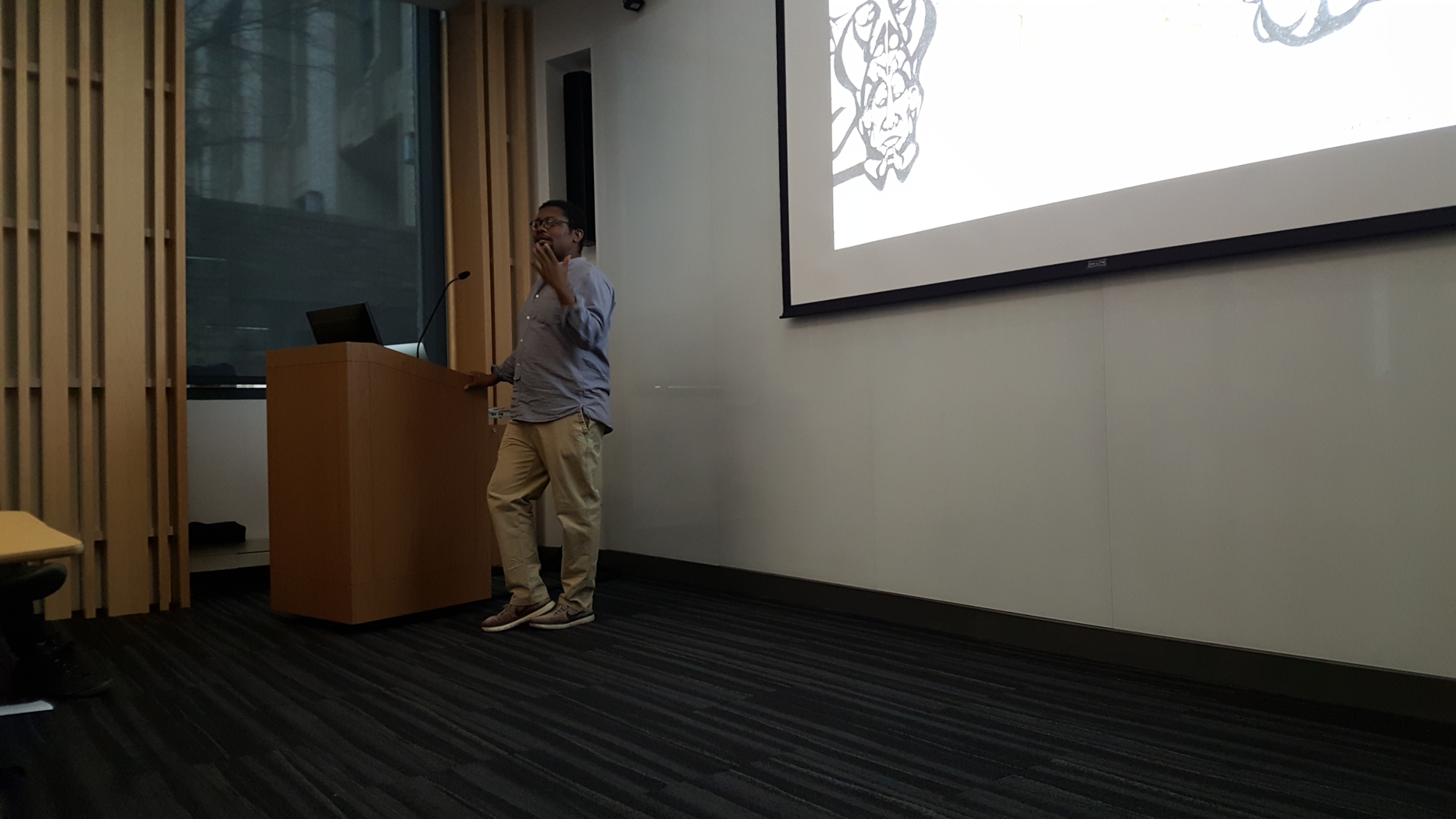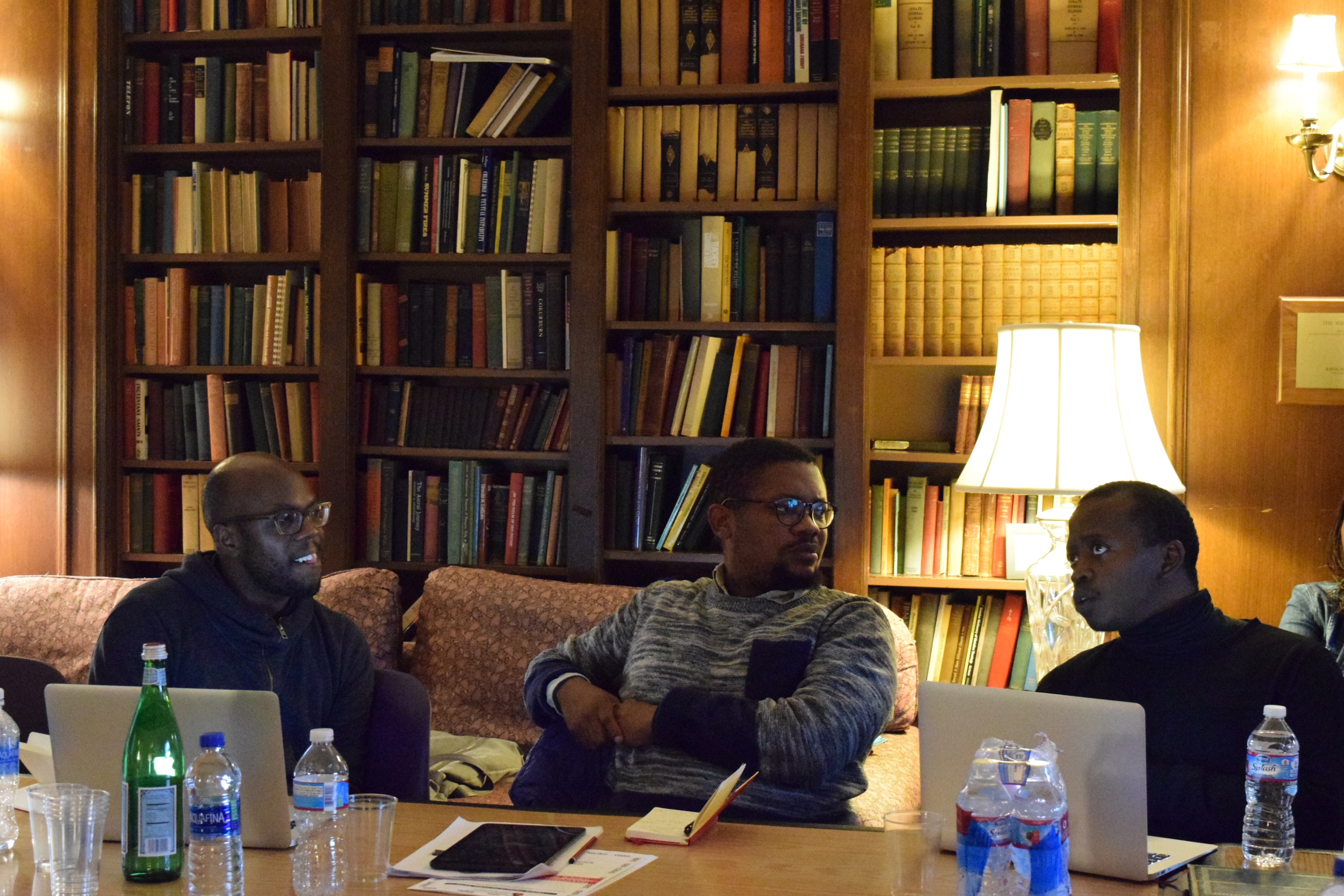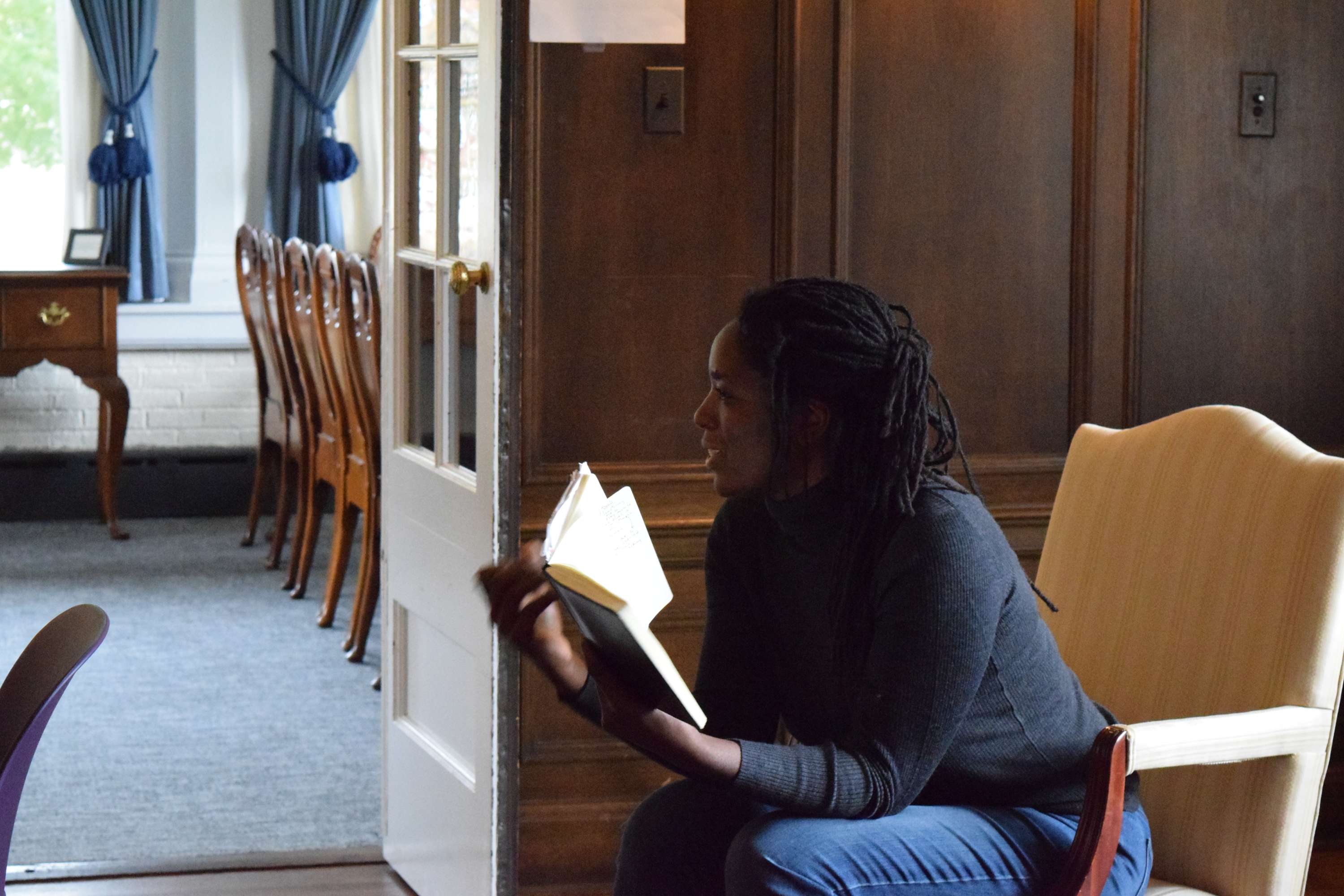Appropriation and Its Discontents
This collaborative project--between Professor of Art History Huey Copeland (at Northwestern University during the time of the project, now BFC Presidential Associate Professor at the University of Pennsylvania) and Athi Mongezeleli Joja (South Africa based art writer and MFA candidate at the University of the Witwatersrand during the time of this project)—has focused on comparative approaches to theories of cultural appropriation, with a particular emphasis on the global circulation of black bodies, discourses, and art forms from an Afro-pessimist perspective. Together, Copeland and Joja developed interdisciplinary graduate and undergraduate courses that critically interrogate the ways in which blackness variously functions across and between the global North and South.
Participants
Huey Copeland initiated this sub-project while Associate Professor of Art History and affiliated faculty in the Critical Theory Cluster, the Department of African American Studies, the Department of Art Theory & Practice, and the Gender and Sexuality Studies Program at Northwestern. (He is now BFC Presidential Associate Professor at the University of Pennsylvania).
Focusing on modern and contemporary art with an emphasis on articulations of blackness in the Western visual field, Copeland is the author of Bound to Appear: Art, Slavery, and the Site of Blackness in Multicultural America (2013), as well as numerous articles and chapters. He is currently at work on a new book, In the Shadow of the Negress: A Brief History of Modern Artistic Practice, which explores the constitutive role played by fictions of black womanhood in Western art from the late-eighteenth century to the present. Photo by Bonnie Robinson for The Graduate School, 2017.

Athi Mongezeleli Joja is an art critic based in Johannesburg, South Africa. A member of the art collective Gugulective, he is currently studying toward his MFA at the University of the Witswatersrand on the critical practice of late critic Colin Richards. His writing has appeared in publications such as Art Throb, The Mail and Guardian, Contemporary And (C&), Chimurenga Chronic, and Africanah.
Project Syllabi
Copeland and Joja generated two versions of the "Appropriation...." syllabus; the first approaches the problem of appropriation in art and culture from a North American art historical perspective, and the second expands and critiques the first from a South African perspective.
- Appropriation.... (Art History and Critical Theory, Northwestern 2017)
- Appropriation ("North" and "South").... (Art History and Critical Theory, Northwestern 2019)
A comparative, side-by-side visualization of the two versions of the syllabus is available via Juxta.
Background
Huey Copeland, Sampada Aranke, and Athi Mongezeleli Joja speak on the concepts of Afro-Pessimist Aesthetic, the practice of Appropriation in Art, and the relationship of Art History to Critical Theory. Watch the video here.
Burton and Ellegood - Take It or Leave It: Institution, Image, Identity
Although practices of appropriation and institutional critiques emerged from distinct periods in contemporary art, they intersected during the 70s at the heart of the civil rights movement. The two articles in this reading raise questions towards the function of the author/viewer in the art's power to inform beliefs shaped by reactions, interpretations, and identities, in a struggle against institutions. Read here.
Kader Attia - Reframing Black Subject Ideology
The re-emerging African Subjectivity and the interests of the past White authority converge in the representation of body-politics, blurring the binary within a new South African nationalism in its imagery. This essay challenges ethical ground for a radical revisionist history to unsettle the apparatus of power, in the relationship of both the white and black artist to the black body. Read here.
Okwui Enwezor - Colonial Modern
The influence of "Africanity" on the reappropriation of Western modern art and architecture in previously colonized countries create intermediary spaces binding separate binary modernities of Western and African cultures, where the lines between reinterpretation of traditional objects and re-appropriation of meaning and power becomes blurred. Read here.
Robert Nichols - Theft is Property: The Recursive Logic of Dispossession
Can theft precede the creation of property? This is a question that has long divided critical theorists, particularly along a pre- and post-Marxist axiom. Here, Nichols analyzes whether the semantic encoding of ‘dispossession’ entails a contradiction, or if it can instead operate recursively to establish the very property it is to steal. Read here.
Craig Owens - The Discourse of Others: Feminists and Postmodernism
The 20th century’s structural disarmament of european hegemony has allowed for the dissemination of both postmodernism and postmodern knowledge. Among similar challenges, Owens seeks to reconstruct how the feminist position leverages its representational presence with the contemporary transfiguration of socio-artistic mastery? Read here.
Related Articles
Supplemental Project
Afro-Pessimist Aesthetics
The Afro-Pessimist Aesthetics class emerged as the third collaborative investigation on the phrase "Afro-pessimist Aesthetics" by Professors Aranke and Copeland. The first iteration of research was organized as a 2017 roundtable, which was followed by a publication of said contributors in a 2020 edition of ASAP/J. The class takes a focused look at current debates in Black Studies around “Afro-pessimism,” a term that refers to a series of political orientations that help us understand the paradigmatic antiblack violence that structures everyday Black life. This class considers how these theoretical interventions have entered popular culture, as artists, critics, and cultural producers across various contexts have turned to Afro-pessimism as both a framework for artistic production and a means of critical engagement with it.

Sampada Aranke (PhD, Performance Studies) is an Assistant Professor in the Art History, Theory, Criticism Department at the School of the Art Institute, Chicago. Her research interests include performance theories of embodiment, visual culture, and black cultural and aesthetic theory. Her work has been published in e-flux, Artforum, Art Journal, ASAP/J, October, and Trans-Scripts: An Interdisciplinary Online Journal in the Humanities and Social Sciences at UC Irvine. She has written catalogue essays for Sadie Barnette, Rashid Johnson, Faith Ringgold, Kambui Olujimi, Sable Elyse Smith, and Zachary Fabri. She's currently working on her book manuscript entitled Death's Futurity: The Visual Life of Black Power.
Project Syllabus
This syllabus is organized both through conceptual scaffolding and through themes. Students were tasked with focusing on and writing about artists (of their choosing) that they researched and studied through the lens of the class.
Afro-Pessimist Aesthetics Syllabus (Art History and Critical Theory, Spring 2020)
News and Events
- November 2020 | Northwestern
Workshop: Death’s Futurity: The Visual Life of Black Power
"Death’s Futurity: The Visual Life of Black Power" is a re-publication book workshop with Sampada Aranke and Huey Copeland. Responses by æryka hollis o’neil, Jordan Mulkey, Harrison Graves, and Alex Weheliye, via Zoom (November 2020) as part of Appropriation and Its Discontents. Watch the video here.
- August 2018
Copeland and Joja completed their collaborative syllabus "Appropriation...." They generated two versions of the syllabus, both of which are available for consultation, download, and comparison above. - April 6, 2018
Athi Joja has completed his residency at Northwestern and returned to the University of the Witwatersrand. During his stay, he focused on comparative approaches to the black arts, particularly in terms of theories of cultural appropriation and the global circulation of black bodies from an Afro-pessimist perspective. To facilitate this work and to broaden their intellectual framework, Copeland and Joja curated a series of 3 monthly events during the quarter: the first 2 were reading and discussion groups—comprising approximately a dozen faculty and graduate students from Northwestern and the School of the Art Institute of Chicago—examining recent books exploring black visual cultures from radically interdisciplinary perspectives (Fred Moten's Black and Blur and Tina Campt's Listening to Images); the 3rd and final event was Joja's lecture "Dumile and the Sketches of Jazz." - April 3, 2018 | Northwestern
Visiting scholar Athi Joja delivered his paper "Dumile and the Sketches of Jazz." Exploring how jazz impacted the visual language of the iconic South African artist Dumile Feni, Joja presented an introductory overview of Feni’s unique oeuvre and the intricate ways in which jazz both constitutes much of its subject matter and, more importantly, informs its expressive grammar. Joja argued that in spite of Dumile’s noted stylistic and formal shifts throughout his career, jazz remained the most consistently present idiom in his work, shaping his well-known beautiful line.
- January 2018 | Northwestern
Athi Joja is in residence at Northwestern and working with Professor Copeland on their collaboration. Welcome, Athi! - November 10–13, 2017 | Northwestern and the School of the Art Institute of Chicago
Athi Joja visited Northwestern for "Transformations of Critical Theory," the inaugural workshop of the Critical Theory in the Global South Project, where he and Professor Copeland presented their work on the Appropriation and Its Discontents project, with a response from Northwestern graduate student Mlondolozi Zondi. On the final day of the workshop, Copeland, together with Fumi Okiji, Northwestern's 2017-18 Black Arts Postdoctoral Fellow, led a graduate-student teach-in on the theme "Afro-Pessimism, North and South.”
On November 10, Copeland, Joja, and Zondi, alongside Frank Wilderson, III (University of California, Irvine) and Sampada Aranke (School of the Art Institute of Chicago), presented their work at "Afro-Pessimist Aesthetics: A Roundtable" at the School of the Art Institute of Chicago. Copeland is at work with Joja and Aranke to assemble these contributions—along with a commissioned response to them—with an eye towards publishing all of the materials as a dossier in a peer-reviewed journal in 2019.
From left to right: Huey Copeland, Athi Joja, and Mlondi Zondi
Fumi Okiji



